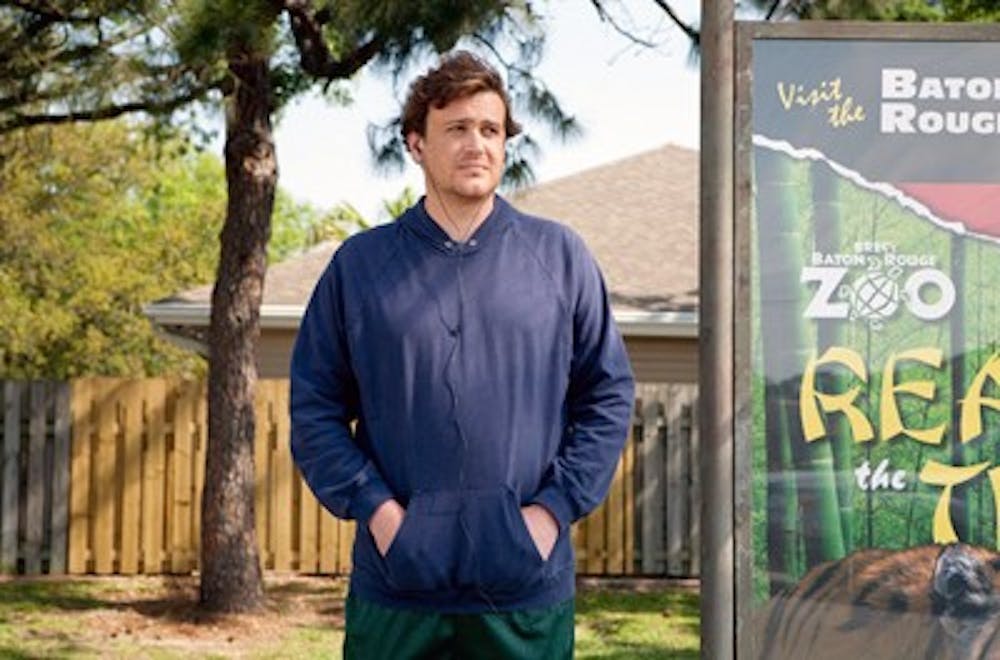“Jeff Who Lives at Home” is a comedy about destiny coming into the lives of two doldrum brothers Jeff (Jason Segel) and Pat (Ed Helms).
Actor Jason Segel ("Forgetting Sarah Marshall," "I Love You, Man") and director Mark Duplass (who also starred in "The League") phoned in for a conference call with student journalists nationwide to talk about their movie, their careers and how they got to where they are now.
Question: Jason, do you prefer doing television shows or movies?
Jason Segel: I think I like working on the movies better because it’s such a concentrated amount of time.
For three months, your job is to focus on a character and then you get to leave it behind whereas when you do something for eight years, it becomes a little bit more like going to school.
You go everyday and it’s the best school you could possibly hope to go to, but there’s something really fun about getting to know people in a very contained amount of time.
Q: What is it about Jeff that drew you to the part?
JS: It was just so clear to me how to play the part and that’s all due to the way the brothers wrote the movie. My job was just to kind of come in and do what they had written. I think the story is just unbelievable.
Q: Ed Helms mentioned a lot of improvisation on set. How do you know when you nail a scene from an actor’s perspective? Or a director’s perspective?
JS: I hate when I can tell an actor knows he’s nailed a scene. It’s my least favorite thing to notice when I’m watching a movie, to see someone be a little bit proud of themselves. You know if you watch carefully. So I try not to think about that too much.
MD: I have a basic rule of thumb, which is if you’re ever asking yourself the question, “Do we have it?” you definitely don’t have it. As soon as you stop drilling that question, you usually feel like you’ve got a sense of it.
With improvisation, you have to keep a bit of a tally in your head about what you’ve gotten so far and what you think you need. A lot of it’s just about trusting your gut.
Q: Is there an interview question that you’re always asked that you’re just sick of?
MD: “What was your motivation for writing this film?” It’s usually the first question I get, and it’s definitely an interview killer.
JS: Mine doesn’t relate to this movie, but for the past eight years it’s been, “Who is the mother?”
MD: Oh. No they don’t.
JS: All. Yes, every interview— “Who is the mother?”
MD: God. See, I can just hear your soul deflating right now.
JS: The other one that was rough over the past like year and a half was, “Who is the bigger diva on set? Amy Adams or Miss Piggy?”
MD: Oh, that’s a good one.
JS: At first it was fun, and then after months of press, I was like, I’m an adult. Miss Piggy is a puppet. Please quit asking me this question.
Q: Mark, what has it been like working with your brother on all of your films? Was this film any different?
MD: This is the largest budget we’ve ever worked with so there’s a certain sense of responsibility to make the movie better because more money is being put into it. Our general feeling is that making a movie is really hard and making an entertaining film is almost impossible.
There’s strength in numbers by having two of us, and whatever conflicts might arise between us are quickly dwarfed by the Herculean task of trying to make a feature film that doesn’t suck.
Q: Is there any chance we’ll ever get to see a Dracula musical with puppets?
JS: That musical was allowed to be intentionally bad. That was sort of the point. I worry that if you did a stand-alone version of that musical, you would realize that it was actually bad pretty quickly. I don’t think it could hold up to 20 minutes of watching that.
Q: Your comedies tend to be darker than the mainstream. Can you talk a little bit about your style of comedy?
MD: We really like what we call tragic comedy. You’ve got this guy Jeff, who is 30 years old and living in his mom’s basement. He doesn’t have a job or any real relationships, and his brother, Pat, is even older than that, and he’s trying to get emotional fulfillment out of life by purchasing expensive automobiles.
These are sad situations, but we feel like what differentiates us from the average dark comedy, like “War of the Roses,” is that rather than relish in seeing them get beat up, we love these guys so much and we want them to win.
Q: How did you identify with the character of Jeff?
JS: I had a really unpleasant out-of-work period from like 22 to 25 where I was just waiting around, too. As opposed to Jeff where he was waiting for a sign, I was waiting to be cast, which I guess now there is a parallel to that because you’re considering someone casting you as a sign that you’re worthy.
I related back to this time where I was bopping around with a sense that my destiny was to do something. Mine was to be an actor, but I was kind of waiting for the world to present that opportunity to me.
Q: What was your favorite thing was about working on this film?
MD: I got to shoot car chase scenes for the first time. I got to put a Porsche on the road and drive it fast and shoot it with Jason Segel sticking out of sunroof. I think there was a lot of different fun stuff that we were not normally afforded in our previous films.
JS: I had been doing a lot of writing and producing on the movies I was previously doing but on this one, I was just invited to the party without having to prepare all the food and decorations. My job was to show up and have a good time at the party. I really enjoyed that element of it.
MD: Yes, you showed up, you ate all the f—ing humus and you left before doing the dishes. It was perfect.
JS: It really was nice.
Q: What was it like working with Susan Sarandon?
MD: I was nervous because Jason and Ed, while really popular actors, they’re roughly our age so we felt like peers to a certain extent and that felt normal. But then a screen legend/goddess who’s smoking hot comes down and descends on our set and we don’t want to embarrass ourselves in front of her or offend her with our juvenile film making tactics.
She was so gracious, particularly in regards to improvisation, she was very humble in saying, “I haven’t done this a lot before. I know that you guys have, and I’m interested in exploring.” She placed herself in a position of learning from us a little bit about this comedic improvisation process, as crazy as it sounds.
JS: I was in awe the whole time. Any time you get to work around somebody that you’ve admired for so long, there’s a little part of you that feels like you’ve made it a little bit, like it’s indicative of that you’re coming up in the world.
I’ve had a crush on Susan Sarandon for a long time so just to suppress that I was wildly attracted to the woman playing my mom was easily the hardest part of the movie for me.
MD: There’s a whole bunch of takes that are just useless because it’s basically Jason salivating. I had to get rid of a lot.
Q: What are your inspirations?
MD: Jay and I find ourselves looking at the world of documentaries because we love having iconic, loveable-loser person personalities to anchor our films. Jeff is a character who is an unlikely hero with that loveable loser quality.
I find myself going back and watching things like “American Movie” and “Burden of Dreams” with Werner Herzog. I’m drawn to people who, against all odds, are going for glory in their lives.
JS: For me, it’s broadcast news. You can have a complicated love triangle where no one is the bad guy, there is no villain because that’s what life is like. It’s not complicated.
I remember when I had a terrible breakup, and I found out my girlfriend was dating this new guy and every instinct in your body wants to hate that guy and imagine he’s such a jerk.
But then you have to come to terms with, “Well, she liked me and she is pretty cool, so this guy is probably pretty cool also.” I think that’s a complicated element of his movies. There doesn’t have to be a villain, life is much more nuance than that.
Q: Mark, does being an actor help you with your directing? Jason, have you ever thought about directing?
MD: I’ve learned most about directing through getting annoyed at directors. I used to be guilty of giving people line readings sometimes when I wanted to get something specific. But when I was on the other side, I realized how annoying that is.
JS: I think to do anything creatively you have to have a real sense of confidence and arrogance, even if it’s false. When I take a part, I really do believe there’s nobody who could do that part better than me.
Same goes for writing a script. I have yet to feel about directing like no one could direct this better than me. Until I have that feeling like no one could direct this better than me, I don’t see a point of me doing it just for the sake of saying I’ve directed. That seems pride based and it’s not really how I operate.
Q: What challenges did you guys face when it came to filming a movie that takes place in one day?
JS: We shot as much chronologically as we could and I gained 25 pounds during the shooting of this movie, so it’s also the very subtle story of a man who gains 25 pounds over one day.
MD: The skies and the backgrounds tend to change a lot and you have to deal with those logistical nightmares. From a practical level, the guys are in the same wardrobe the whole time, so it was easy to shuffle around scenes and change things around.
Q: Mark, will “Do-Deca-Pentathlon” be getting a wide release?
MD: We’re in the process of selling the film right now, it will be announced at South by Southwest, and the movie will definitely be available later this year.
Q: Mark, you went from Greta Gerwig being the biggest name on the “Hannah Takes the Stairs” poster to having an entire cast of really well known actors. How did that happen? And how is it different working with big name actors?
MD: We’re honestly just really blessed that these people are seeing our movies and want to be a part of them.
Jay and I are obsessed with the performance, and if you work with us as an actor, you’ll quickly figure out that we don’t give a s—t what the lighting looks like or the way the camera is moving. Our main focus is performance, so actors want to work with us because they know we’ll make them look good.
I get starstruck on the first meeting and I’m like, “Oh s—t. I’m talking to Susan Sarandon. I’m talking to Jason Segel. I’m talking to Ed Helms.” And then 35 seconds later you’re like, “Oh, they’re just like me,” and then it’s fine and you’re done.
Reach the reporter at roxana.baldovin@asu.edu
Follow us on Twitter or like us on Facebook. Click here to subscribe to the daily State Press email newsletter.





